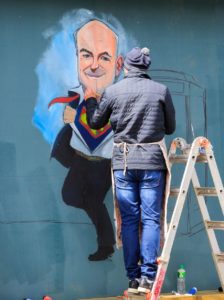
“Not all heroes wear capes” is a refrain we’ve become used to during this pandemic. A recent mural on the front of a Dublin pub depicts Dr Tony Holohan emerging Superman style from a phone box ready for action in the fight against Covid 19. Of course, all of the front line workers including medical personnel, cleaning staff, Gardaí, retail and public services workers are deserving of our gratitude and respect but, there’s another group of unmasked crusaders I’d like to add to this list: teachers and school leaders.
Since schools closed suddenly and with no warning before a public press conference on Friday 13th March, teachers and school leaders have been working consistently to help meet their students’ needs in unprecedented circumstances. I was at the Educate Together Principals Conference when that announcement was made and was in a room with fifty school leaders. The reaction reminded me of a question you’re often asked as a second-level teacher, “What do you teach?” to which the tongue-in-cheek answer is, “Students.” But, that was where the minds of those school leaders and their teachers went first, not what does this mean for me or my family but what does this mean for our students?
The concern over students’ welfare and wellbeing is still forefront in teachers’ and school leaders’ minds. Supporting students’ learning and engagement and trying to mitigate the impact this will have on all students but particularly those with additional needs and those experiencing disadvantage has dominated discussions in recent weeks.
Despite the challenges of having to adapt to teaching in an online environment while also in many cases, looking after their own children or other family members, teachers and school leaders have continued to excel and go the extra mile. This is clear from the examples of good practice demonstrated by many schools since schools closed that extend beyond just ensuring learning continues. Teachers and school leaders have been innovative in their approaches to support student wellbeing including sending check-in postcards, organising art and musical displays, online assemblies and “yard-time”. And those are only the examples that we know of. There’s no doubt that lots of schools are similarly working to continue to provide emotional and social support in a range of other ways.
The care that teachers and school leaders show to their students is also clear from their responses to the Junior and Leaving Cert examinations proposals. At each stage, teachers and school leaders sought fairness and equality for their students and voiced concern when they felt this could not be provided. When the DES proposed teachers would return to teach students for two weeks in July, I believe the vast majority of teachers were willing to do this, provided it would be safe to do so. When the announcement was made that predicted grades would be used for the Leaving Cert, many teachers were upset, not because of the increased workload and stress associated with changing to this mode of assessment so late in the two year programme, but because it meant that they could no longer be in contact with their students. For many, they missed the opportunity to say goodbye.
Similarly, at primary level, teachers and school leaders are missing out on 6th class graduation celebrations and events. The toll of missing out on these personal interactions and milestones will be felt by the teachers and school leaders as well as the students.
With all the focus on exams, it’s sometimes overlooked that relationships are the most important thing in teaching and the most important thing to teachers. My sympathy goes out to all students and teachers who have been impacted by these sudden changes but they all also have my admiration. In the face of challenges and difficulties never before encountered, teachers and school leaders are continuing to work and provide support to students, families and each other.
So here’s to our educational heroes! Thank you.
Laura Dooley
Second-level Education Officer
